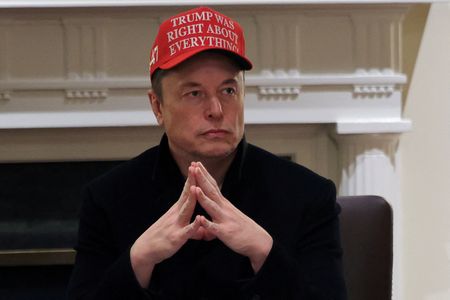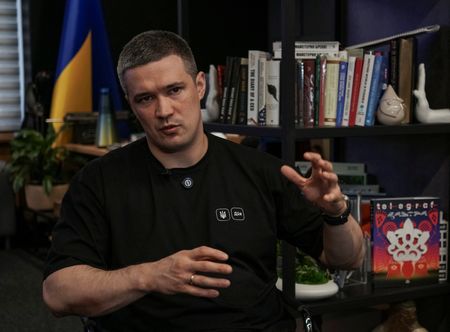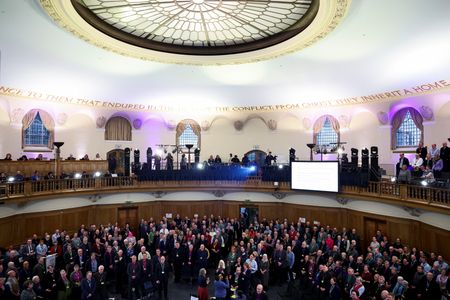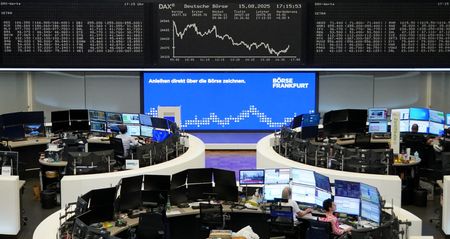By Rachael Levy, Abhirup Roy, Isla Binnie
(Reuters) -Tesla’s board on Thursday rushed to defend its chief executive, Elon Musk, assuring he had the board’s confidence amid rising investor worries about his prolonged absences, polarizing politics and the EV maker’s plunging sales and profit.
The board reacted after a Wall Street Journal report that it had considered replacing Musk, which board chair Robyn Denholm denied. Denholm herself has taken heat for her high compensation and perceived failures to hold Musk accountable to shareholders.
The latest Musk drama underscores the unique dilemma Tesla’s board faces in managing him as he oversees five other companies and, more recently, has focused primarily on advising Republican U.S. President Donald Trump – alienating Tesla’s politically liberal customer base. Yet seldom have a company’s fortunes depended more heavily on the persona of its CEO, making even the notion of replacing him an enormous risk, according to investors, analysts and three people with knowledge of debates about Musk among Tesla executives.
Many analysts have attributed about three-fourths of Tesla’s outsized stock-market value – which far outpaces its current earnings – to autonomous-driving technology and humanoid robots that Musk has promised but failed to launch for years.
Tesla bulls view Musk as the singular genius who can deliver that future despite intensifying global competition on such technologies, especially from China, where automakers led by BYD have already blown past Tesla in producing low-cost EVs.
Denholm seemed to address the Musk faithful as she denied the Journal report, saying the board was “highly confident” he could execute “the exciting growth plan ahead.”
The growth cannot come soon enough, as the fundamentals of Tesla’s automotive business continue to deteriorate. Its EV sales declines have been especially sharp in Europe, where Musk’s and Trump’s politics have proved especially toxic.
Company insiders have suggested to Musk for years that he replace himself in a different way – by hiring a top executive as a day-to-day manager while Musk continues as more of a figurehead, two people familiar with the discussions told Reuters. Other Musk companies operate that way, most notably rocket-maker SpaceX, where Gwynne Shotwell serves as president and COO.
Musk has consistently refused to do the same at Tesla, the two people said.
The board would face immense difficulty replacing Musk, said Brian Mulberry, client portfolio manager at Zacks Investment Management, a Tesla investor. The “incredibly complex” challenge requires filling Musk’s enormous shoes and bridging the financial chasm his leadership has left – keeping Tesla’s struggling EV business profitable while delivering the long-promised “robotaxi network.”
On a 10-point difficulty scale, replacing Musk would be an “eight or nine” Mulberry said, adding it would require someone with “a persona of their own who can step into that and won’t always be in Elon’s shadow.”
Gene Munster, managing partner at Tesla investor Deepwater Asset Management, called replacing Musk essentially impossible.
“Is Musk bigger than Tesla? The answer is yes,” he said.
Musk and Tesla’s board did not respond to request for comment. Musk needled his critics at a White House Cabinet meeting Wednesday, placing two Trump-fan ball caps on his head, one reading “Gulf of America.”
“They say I wear a lot of hats,” Musk said, drawing Trump’s laughter. “It’s true.”
EXECUTIVE EXITS
Any successor might then have to deal with Musk as a board member and the company’s largest shareholder. He currently holds a 13% stake.
Tesla’s executive bench has thinned in the past year as Musk pivoted the company away from its long-held goal of becoming an EV giant to focus on robotaxis, robots and artificial intelligence.
The departures included senior leaders who had resisted shifting Tesla so forcefully away from its core business of human-driven cars, according to three people with knowledge of discussions among Tesla executives. Some of them presented their concerns to the board, which sided with Musk, the people said.
Gary Black – managing partner of the Future Fund, a Tesla investor – wrote on Musk’s platform X that the company has no viable in-house executives to replace him.
“We do not see anyone inside (Tesla) with the broad range of technical, strategic, and execution skills.”
James McRitchie, a private Tesla investor, said he doubted board members would move against Musk because of his influence over their appointments and their unusually high compensation. McRitchie acknowledged the risks of replacing Musk.
“A lot of the share price is tied to the love of Elon and having robots do everything for us,” he said.
McRitchie compared Musk to legendary General Electric CEO Jack Welch, whom investors viewed as “God.”
“But when he left, it was a house of cards,” he said. “I think the same is probably true of Tesla. It’s a good company, but it could be a much better company and it’s over-valued.”
Mulberry, of Zacks, said Tesla can succeed with or without Musk.
“You’ve already got a great range of EVs, you’ve got the robotaxi and full self-driving,” he said, referring to Tesla’s driver-assistance technology. “Now it’s just about managing it to a point of completion … Do you really need another wave of innovation from Tesla, or do you just need proper execution?”
(Reporting by Rachael Levy in Washington, Abhirup Roy in San Francisco and Isla Binnie in New York; Additional reporting by Chris Kirkham in Los Angeles and Trevor Hunnicutt in Washington; Writing by Brian Thevenot; Editing by Matthew Lewis)











